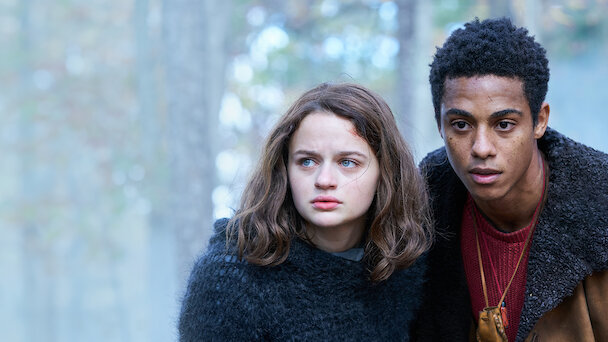Television Review: “Uglies” — Is This Dystopia Really Necessary?
By Sarah Osman
By not giving the material a refreshing 21st-century update, the film version of Uglies comes off as an unattractive antique.

A scene in Uglies featuring Joey King and Keith Powers experiencing nature. Photo: Netflix
Long before Katniss entered the arena and Tris joined the Dauntless, things were ugly. In 2005, Scott Westerfeld introduced us to the concept of Uglies in his aptly titled YA novel, Uglies. Set in a future dystopian universe, the premise is that everyone is considered ugly until their 16th birthday when they undergo cosmetic surgery to be pretty. Once they receive their surgery, they move in with the other “pretties” in a city where they have no responsibilities (think never-ending Gatsby party). Until then, the uglies live in the dorms and plan out what their new look and life will be like, eagerly awaiting the day until they are finally pretty.
Uglies, the novel, boasted an intriguing concept and the narrative was surprisingly poignant as it explored the intersection of identity and beauty. Its message was particularly powerful in the early-to-mid 2000s, a time when anyone over 115 pounds was considered a pig and certain retail stores only employed “pretty” people. The story also touched on the idea of constant surveillance of teenagers, which had exploded because of the popularity of cell phones and the internet. Uglies the book was downright ahead of its time. Unfortunately, the Netflix cinematic version is coming out nearly 20 years later. A lot has changed in the culture since 2005, but the movie ignores most of it — it is an anachronistic exercise.
Uglies follows the book, for the most part. Joey King stars as Tally Youngblood, an “ugly” who is eagerly waiting for her transformation day. After her friend Peris (Chase Stokes) becomes “pretty,” she goes to visit him in the city — only to discover he’s no longer the same. She escapes the urban hullabaloo thanks to her new friend, Shay (Brianne Tju) who introduces her to the idea of living in nature (cue undernourished vision of Thoreau’s Walden). When Shay goes missing on transformation day, Tally is forced to go find her or risk exile. She eventually discovers that Shay is hanging out amongst the Smokies, who live out an ersatz Transcendentalist fantasy.
The first half-hour or so of Uglies is effective. King tries her best to make Tally an enticing protagonist, fighting against a bland script. Best, most disturbing scene: her shock at seeing the new Peris. But, once Tally goes after Shay, the film’s pacing shifts from reasonable to super-speed. Her journey through the forest is rushed, her time with the Smokies and new love interest David (Keith Powers) is blurred. Her adoration of the Smokies happens in the blink of an eye. Uglies, the book, doesn’t slide lickey-split through its narrative arc — why does the film have to sprint? Is it that director McG doubted that teenagers have the attention span to sit through a reasonably paced film? Well, he miscalculated: most TikToks are better paced than Uglies.
King isn’t the only actor who struggles with the cliche script. Laverne Cox plays big bad Dr. Cable and, despite her best efforts to make the villain charismatic, she falls flat. Powers is a downright dull love interest, and Stokes can’t make Peris sympathetic in any way. There’s no romantic chemistry among the teen protagonists, so the potential of cooking up an inevitable love triangle for the (possibly inevitable) sequel is a lost cause.
Finally, the biggest problem with Uglies is that it’s 15 years too late. Far too many YA dystopian dramas have come and gone off the downer assembly line, none of them approaching the enormous success of The Hunger Games. Dystopia isn’t a dead genre (i.e. HBO’s beautiful Station Eleven), but the YA dystopian craze of the 2000s has run out of futuristic gas. Ironically, Uglies might have worked, considering that it critiques behaviors that still run rampant in our social-media obsessed world. But, by not giving the material a refreshing 21st-century update, Uglies comes off as an unattractive antique.
Sarah Mina Osman is based in Los Angeles. In addition to the Arts Fuse, her writing can be found in Huffington Post, Success Magazine, Matador Network, HelloGiggles, Business Insider, and WatchMojo. She has an MFA in Creative Writing from the University of North Carolina Wilmington and is working on her first novel. She has a deep appreciation for sloths and tacos. You can keep up with her on Instagram @SarahMinaOsman.
Tagged: "Uglies", Brianne Tju, Chase Stokes, Joey King, Keith Powers, McG
